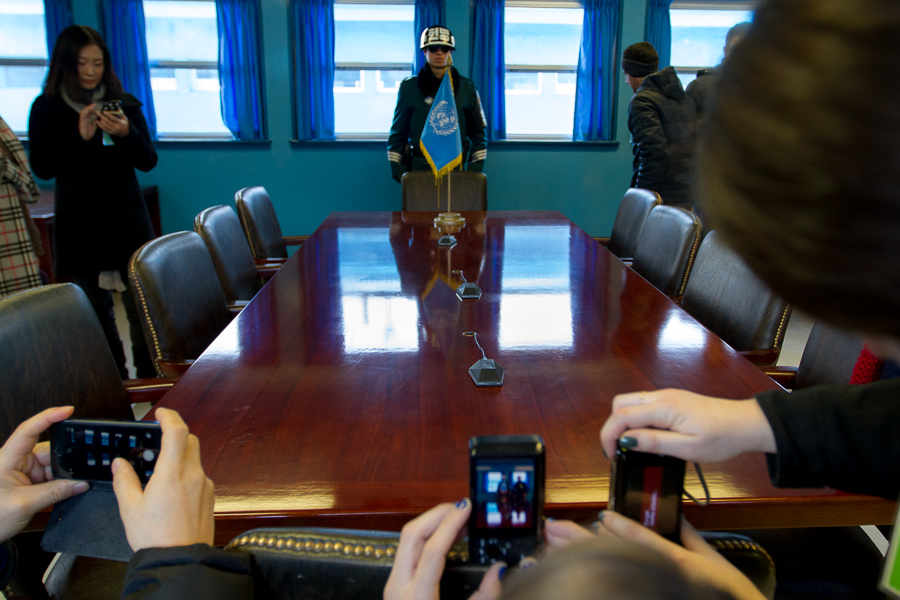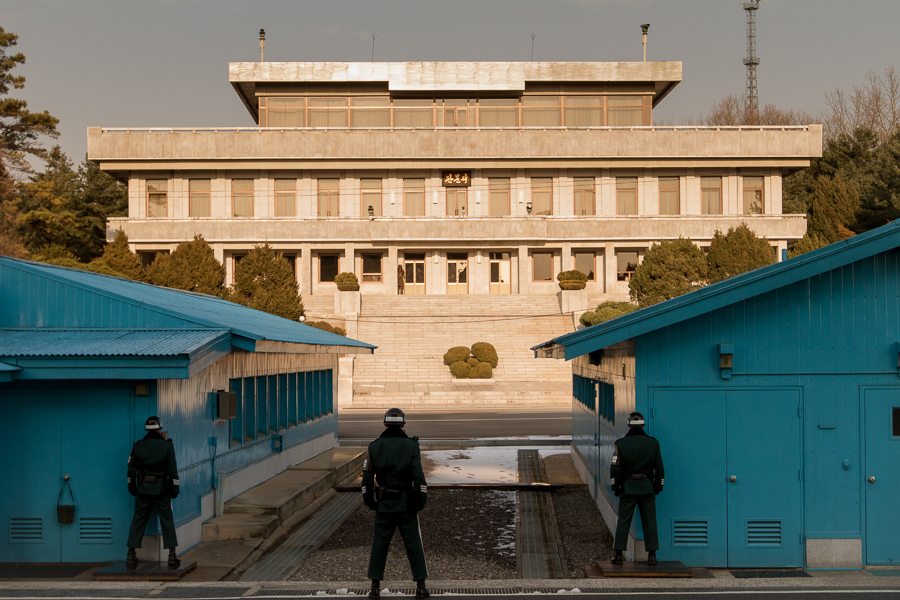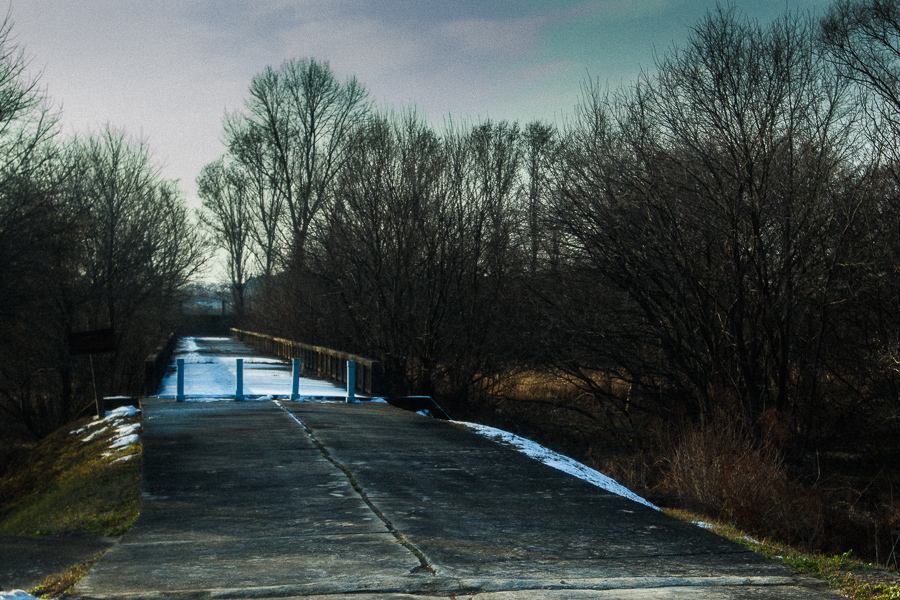Yesterday I spent four minutes in North Korea. Proof:

That's inside the Military Armistice Commission (MAC) conference building, within the Joint Security Area near the village of Panmunjom. The line of microphones on the desk follows the Military Demarcation Line (MDL) dividing North and South Korea. To my left is South Korea; to my right is North Korea.
You have to take an organized tour to get to the JSA. Because, let's review: (a) it's an active war zone; (b) it's a diplomatic base with heavy military presence; and (c) you don't want to get kidnapped by the DPRK. (The tour I took cost $78 and included a delicious bulgogi lunch at a roadhouse outside Puja.)
Here's the first up-close-and-personal view of North Korea you get:

The blue building to the left is the MAC Conference Center from the photo above. The blue building to the right is another ROK-administered structure. Running between them, on the ground, you can see a raised concrete curb about 10cm tall. That is the MDL—the border with North Korea. Assuming you could get past the armed U.S. Army guys I decided not to photograph, and get past the ROK officer in the center, and the two beefy MPs on either side, you could make that border in just a few steps from where I was standing. Then you'd have a really difficult time getting back over it, and a harder time, whether or not they let you back in South Korea, staying out of jail on one side or the other.
It's surreal. The border is an abstract concept but two enormous armies make connect the abstraction to reality. A bunch of tourists, half of them Japanese, took an ordinary tour bus to a United Nations military base a few hundred meters from a hostile country, got a slide show about axe murders and not gesturing to or speaking with North Koreans, then got on a U.N. bus and drove—slowly—past mine fields, tank defenses, and rice paddies. (About 700 people live just outside the JSA, within the DMZ.)
Here's another chilling place, the Bridge of No Return:

Yeah, don't cross that bridge. You won't come back. Seriously.
Today I'm heading over to the Korean History Museum and possibly the War Memorial. I've been thinking a lot about Seoul and my reactions to the city. At first approximation, modern Seoul is defined by a war that hasn't ended.
With only a few hours to go before I jet out of Chicago, I'm squeezing in client work and organizing my apartment while on conference calls. Also, I'm sending these to my Kindle:
Back to debugging...
A popular Canadian broadcaster, Rick Mercer, reminds Ontarians that Rob Ford's politics matter:
I had enough time during today's 8-hour meeting to queue up some articles to read later. Here they are:
As for today's meeting, this.
The Chicago-based Council on Tall Buildings and Urban Habitat has ruled that One World Trade Center is taller than Willis Tower:
The decision by the Chicago-based Council on Tall Buildings and Urban Habitat hinged on whether the tower's mast was a spire, which counts in height measurements, or an antenna, which doesn't.
The decision will end Willis Tower's reign of 40 years as the nation's tallest building.
The announcement culminated weeks of speculation about the ruling, which drew widespread attention because it would finally settle the issue of whether Chicago or New York could claim bragging rights to having the nation’s and the Western Hemisphere’s tallest building, as well as whether One World Trade Center would achieve the symbolic height of 541 m.
Willis Tower, completed in 1974 and once the world’s tallest building, is 442 m tall. Dubai’s Burj Khalifa, the current holder of the title, is 828 m tall.
The decision means One World Trade Center is the 3rd tallest building in the world, and drops Willis Tower to 10th place overall.
Boo.
Sometimes, Canadians and Americans seem so much alike. The problem becomes trying to determine which Americans and Canadians you mean.
Exhibit: Police in Toronto have recovered a video they allege shows mayor Rob Ford smoking crack. (Ford's lawyer said it was pot—even though weed may also be illegal in Ontario.)
A friend who lives there just sent me new polling data that shows Canadians have a sense of humor:
A new poll released Friday shows Mayor Rob Ford’s approval rating has actually climbed since the announcement by Police Chief Bill Blair that a highly reported video does exist.
The Forum Research poll taken on Thursday shows that Mayor Ford’s approval rating has climbed slightly, sitting at 44 percent.
[Poll spokesperson Lorne Bozinoff added,] “We asked if he should resign or not, a large majority, 60 percent said yes.”
The poll also revealed that a staggering 98 percent of the people polled had heard about the alleged crack video.
No word from the pollsters whether people approve of Ford strictly for entertainment value.
...brings us Wait Wait...Don't Tell Me!, the NPR news quiz hosted by actor and playwright Peter Sagal. Last week, one of the panelists presented an extended joke about Poland. Never mind that the panelist is probably of Polish descent; the piece annoyed the Polish consulate:
Peter Grosz, an actor and TV writer who has appeared as a panelist and guest host on "Wait Wait," offered a supposed news item referencing a joke asking how many Poles it takes to screw in a light bulb.
Host Peter Sagal revealed the light bulb tale wasn't true, but instead another item about road-crossing chickens was the real news. Listeners later called "Wait Wait" and the Polish Consulate to complain that the joke was in poor taste.
In a letter to Danforth, Paulina Kapuscinska, consul general of the Republic of Poland in Chicago, said the joke played up false stereotypes of Poles and Poland. It presented National Public Radio, which distributes the show, as "promoters of prejudice," and such jokes "are some of the most unsophisticated of jokes, which offend the intellect of NPR listeners," Kapuscinska wrote.
[Show producer Mike] Danforth replied with an apology, which the Polish Consulate posted on its website Thursday.
"I can't disagree with your judgment that the content of our October 26th show was unsophisticated and insulting to the intellect of NPR listeners. I'm afraid just about everything we do on 'Wait Wait' offends the intellect of the NPR audience," Danforth wrote.
People. Please. Danforth is right; it's a comedy show. The volume of Jewish jokes that Jewish host Sagal tells every week should have been sufficient notice that maybe, just maybe, they might make fun of other stereotypes. Get over it.
Links, the posting of which does not constitute endorsement:
Back to the mines. Sarah Jarosz tonight.
If the AP report is true, this is a complete win for the President:
Assad is now agreeing to preserve and strengthen that norm. He’s agreeing to sign the treaty banning chemical weapons — a treaty Syria has been one of the lone holdouts against. He’s creating a situation in which it would be almost impossible for him to use chemical weapons in the future, as doing so would break his promises to the global community, invite an immediate American response, and embarrass Russia.
This is, in many ways, a better outcome than the White House could have hoped for. Punishing Syria may or may not have actually reinforced the norm against chemical weapons — particularly if the strikes went bad and the American people punished members of Congress who voted for them. But Syria joining the treaty against chemical weapons definitely, almost definitionally, reinforces the ban.
This we call "diplomacy." And it's good to see when it works.
Security guru Bruce Schneier has two essays in the Guardian this week. The first explains how the US government betrayed the Internet:
By subverting the internet at every level to make it a vast, multi-layered and robust surveillance platform, the NSA has undermined a fundamental social contract. The companies that build and manage our internet infrastructure, the companies that create and sell us our hardware and software, or the companies that host our data: we can no longer trust them to be ethical internet stewards.
I have resisted saying this up to now, and I am saddened to say it, but the US has proved to be an unethical steward of the internet. The UK is no better. The NSA's actions are legitimizing the internet abuses by China, Russia, Iran and others. We need to figure out new means of internet governance, ones that makes it harder for powerful tech countries to monitor everything. For example, we need to demand transparency, oversight, and accountability from our governments and corporations.
Unfortunately, this is going play directly into the hands of totalitarian governments that want to control their country's internet for even more extreme forms of surveillance. We need to figure out how to prevent that, too. We need to avoid the mistakes of the International Telecommunications Union, which has become a forum to legitimize bad government behavior, and create truly international governance that can't be dominated or abused by any one country.
He followed up today with a guide to staying secure against the NSA:
1) Hide in the network. Implement hidden services. Use Tor to anonymize yourself. Yes, the NSA targets Tor users, but it's work for them. The less obvious you are, the safer you are.
2) Encrypt your communications. Use TLS. Use IPsec. Again, while it's true that the NSA targets encrypted connections – and it may have explicit exploits against these protocols – you're much better protected than if you communicate in the clear.
There are three other points, all pretty simple.